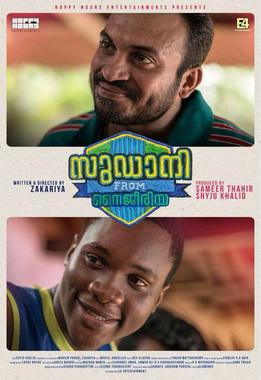
Nigeria, officially the Federal Republic of Nigeria, is a country in West Africa. It is situated between the Sahel to the north and the Gulf of Guinea to the south in the Atlantic Ocean. It covers an area of 923,769 square kilometres (356,669 sq mi), and with a population of over 225 million, it is the most populous country in Africa, and the world's sixth-most populous country. Nigeria borders Niger in the north, Chad in the northeast, Cameroon in the east, and Benin in the west. Nigeria is a federal republic comprising 36 states and the Federal Capital Territory, where the capital, Abuja, is located. The largest city in Nigeria is Lagos, one of the largest metropolitan areas in the world and the second-largest in Africa.

The film industry or motion picture industry comprises the technological and commercial institutions of filmmaking, i.e., film production companies, film studios, cinematography, animation, film production, screenwriting, pre-production, post production, film festivals, distribution, and actors. Though the expense involved in making films almost immediately led film production to concentrate under the auspices of standing production companies, advances in affordable filmmaking equipment, as well as an expansion of opportunities to acquire investment capital from outside the film industry itself, have allowed independent film production to evolve.

The cinema of Nigeria, often referred to informally as Nollywood, consists of films produced in Nigeria; its history dates back to as early as the late 19th century and into the colonial era in the early 20th century. The history and development of the Nigerian motion picture industry is sometimes generally classified in four main eras: the Colonial era, Golden Age era, Video film era and the emerging New Nigerian cinema.

Genevieve Nnaji is a Nigerian actress, producer, and director. She won the Africa Movie Academy Award for Best Actress in a Leading Role in 2005, making her the first actor to win the award. In 2011, she was honoured as a Member of the Order of the Federal Republic by the Nigerian government for her contributions to Nollywood. Her directorial debut movie, Lionheart, is the first Netflix film from Nigeria and the first Nigerian submission for the Oscars. The movie was disqualified for having most of its dialogue in English. After having spent decades in the movie industry, she was profiled alongside some celebrities and business executives in 2020 in two new books by publisher and Editor in Chief of Yes International! magazine, Azuh Arinze.

Omotola Jalade EkeindeListen is a Nigerian actress, singer, philanthropist and former model. Since her Nollywood film debut in 1995, Ekeinde has appeared in over 300 films, selling millions of copies. Omotola is the second Nigerian and first Nigerian celebrity to receive over 1 million likes on her Facebook page. She currently has a total of 3 million followers on Facebook.
Articles related to Nigeria include:

District 9 is a 2009 science fiction action film directed by Neill Blomkamp in his feature film debut, written by Blomkamp and Terri Tatchell, and produced by Peter Jackson and Carolynne Cunningham. It is a co-production of New Zealand, the United States, and South Africa. The film stars Sharlto Copley, Jason Cope, and David James, and was adapted from Blomkamp's 2006 short film Alive in Joburg.

Olufunke Ayotunde Akindele-Bello popularly known as Funke Akindele or Jenifa, is a Nigerian film actress, politician and producer. Akindele starred in the sitcom I Need to Know from 1998 to 2002, and in 2009, she won the Africa Movie Academy Award for Best Actress in a Leading Role. She rose to fame for her role in the movie titled Jenifa which earned her the nickname Jenifa. The Omo Ghetto trilogy contributed to her fame. Funke Akindele played the lead role in the show Jenifa's Diary, for which she was named the Best Actress in a Comedy at the 2016 Africa Magic Viewers Choice AwardsL. Again, at the 2020 and 2022 AMVCA, she took home the same award, making it her third win for the Best Actress in a Comedy category.

The Africa Movie Academy Awards, popularly known as AMAA and The AMA Awards, is presented annually to recognize excellence among professionals working in, or non-African professionals who have contributed to, the African film industry. It was founded by Peace Anyiam-Osigwe and is run through the Africa Film Academy. The awards are aimed at honouring and promoting excellence in the African movie industry as well as uniting the African continent through arts and culture. The award presentation is attended by numerous media representatives, celebrities, politicians, journalists, actresses and actors from all across the world. The AMA Awards is widely considered to be Africa's most important film event and the most prestigious film award in Africa.

Kunle Afolayan(listen) is a Nigerian actor, producer and director. He is widely credited for elevating the quality of Nollywood movies though larger budgets, shooting on 35mm, releasing in cinemas, and improving cliché Nollywood storylines. After starting his film career as an actor in the 1999 political drama Saworoide, Afoloayan made his directorial debut in 2006 with Irapada, a Nigerian supernatural thriller, which won the Africa Movie Academy Award for Best Film in an African Language. His follow-on directing credits include The Figurine, Phone Swap, October 1, and Citation. October 1 was the winner of 16 major African movie awards in 2015 and the second highest grossing Nigerian film in Nigerian cinemas at the time of its release, a feat Afolayan was to repeat two years later with The CEO. In 2021, the director signed a three-picture deal with Netflix. Swallow, the screen adaption of Sefi Atta's book of the same name was the first to be released in October 2021, followed by Aníkúlápó, an epic Nigerian fantasy released in September 2022. Afolayan has described the work as a "Game of Thrones recreated in Nigeria but with a better representation of our culture”. Eleven days after its release, it was the #1 most-watched non-English Netflix original film.

The Africa International Film Festival (AFRIFF) is an annual film festival that takes place in Nigeria. It was founded in 2010 with its Inaugural edition in Port Harcourt, Rivers State, Nigeria. AFRIFF was founded by Chioma Ude a passionate film buff and entrepreneur, The event normally spans through a week and it includes award shows and film training classes. Keith Shiri, the founder/director of Africa at the Pictures is the artistic director of the festival. AFRIFF gives out honors in categories such Feature, Documentary, Short, Animation, and Students Short, as well as awards and prizes for Directing, Acting, and Screenplay. There are additional special awards for Audience Choice and an Outstanding Film Jury Award.

Nollywood, a portmanteau of Nigeria and Hollywood, is a sobriquet that originally referred to the Nigerian film industry. The origin of the term dates back to the early 2000s, traced to an article in The New York Times. Due to the history of evolving meanings and contexts, there is no clear or agreed-upon definition for the term, which has made it a subject of several controversies.

Sudani from Nigeria is a 2018 Indian Malayalam-language sports drama film written and directed by Zakariya Mohammed, with dialogues co-written by Muhsin Parari. Shyju Khalid was the cinematographer, who also produced the film with Sameer Thahir. It stars Soubin Shahir and Samuel Abiola Robinson. The story follows a Nigerian football player who joins a club in Malappuram, Kerala for a sevens football tournament.












